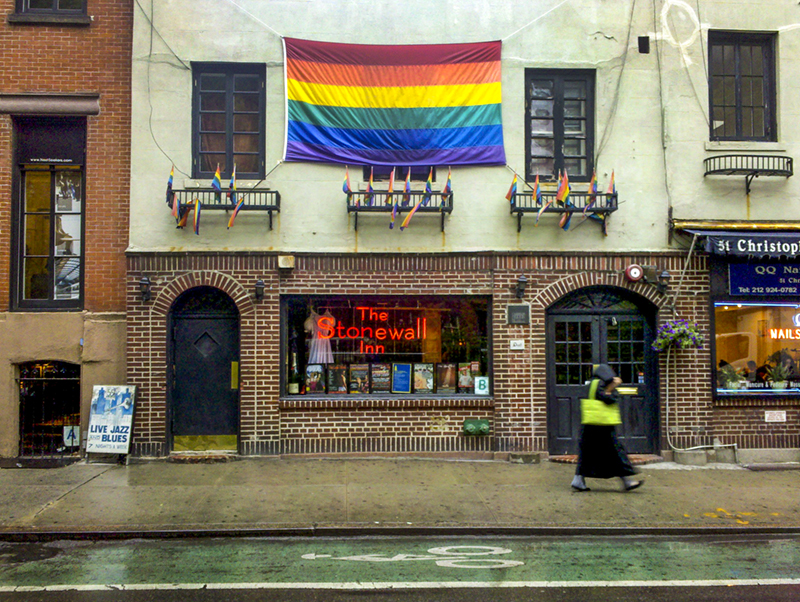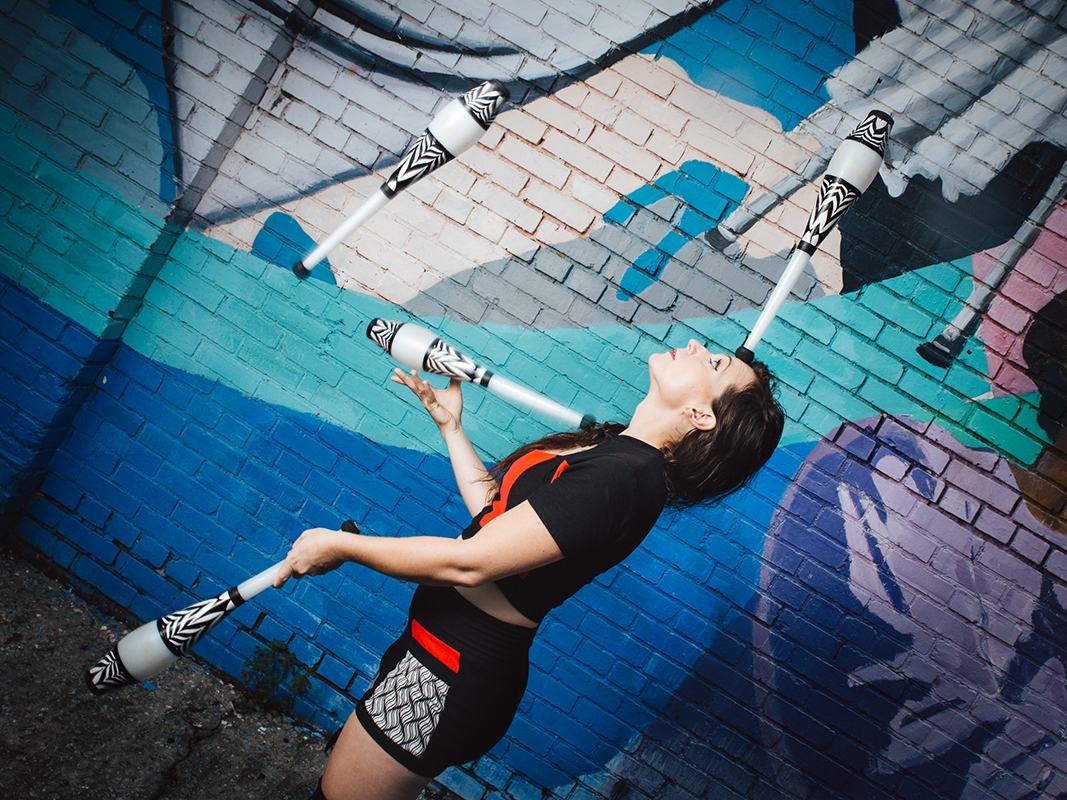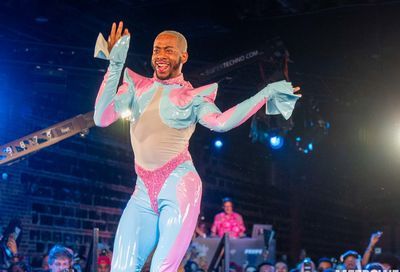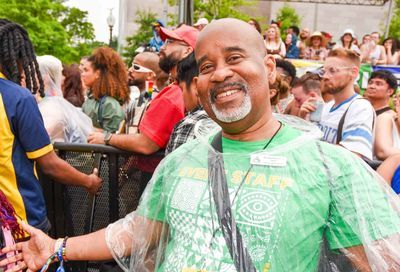The Last Inning
A Whole New Ballgame in Southeast DC
When it comes to baseball, hope springs eternal.
The hopes of Boston’s baseball fans were fulfilled when the Red Sox overcame the curse of the Bambino last year to win the World Series. In Chicago the Cubs soldier on as lovable losers, with hope never waning. Decades after the ignominious departure of the Senators, the hopes of pining D.C. baseball fans were finally rewarded when the Nationals came to town.
And in Southeast D.C. there are those who are hoping against hope that the baseball juggernaut and the new stadium that comes with it can still be stopped. Even as the Nationals play their first official game of the season today, April 14, not everyone thinks the new stadium is a done deal.
The proposed location of the new baseball stadium — a prize piece of the multi-million dollar deal that brought the national pastime to the nation’s capital — lands squarely atop a block of businesses along O Street in Southeast that cater to the gay community.
Ziegfeld’s. Secrets. Glorious Health and Amusement. The Follies. Club Baths. Heat. All lie just beyond the proposed right field. Just outside of the stadium’s environs would be longtime nightlife stalwarts Edge/Wet and Nation — locations that many believe will eventually succumb to the ancillary development the stadium will engender.
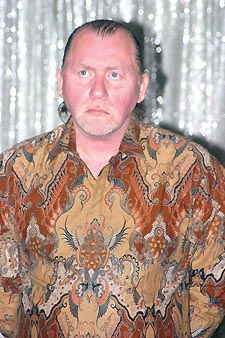 O Street business owner Bob Siegel at the community forum. |
“I’m not happy at all with anything happening here,” says Bob Siegel. He’s sitting in his office at Glorious Health, security monitors behind him keeping tabs on the late afternoon street traffic. Siegel owns all the buildings along this stretch of O Street, with the exception of the Club Baths, and is a landlord for the other businesses.
“I want to continue to be here with what I have here,” he says. “I don’t want to go anywhere.”
This particular block of O Street, between Half Street and South Capitol, in some ways tells the story of the growth and evolution of the gay community. Gay businesses that were forced out of downtown to make way for the old — and recently demolished — convention center set up shop in the area.
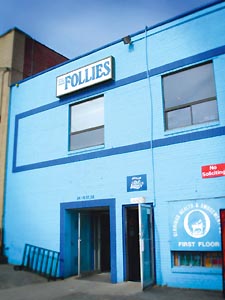 |
The businesses have periodically hit the radar of mainstream media. A fire at the Cinema Follies (a predecessor to the Follies) in 1977 killed nine patrons and led to a crackdown on nightclub safety violations. In 1992 police charged the Follies with being a “bawdy house.” Also in that decade, a rogue group of police officers ran a blackmail scam targeting men they observed leaving O Street businesses. The nude dancing at Secrets, Heat and Wet is famous across the country, as Washington, D.C. is one of the very few cities where such entertainment is allowed.
But where once the city’s emergency workers wouldn’t come through the front door, now elected officials sit down to meet with constituents. Owners and managers say their businesses have thrived. Siegel himself is a notable player in local political circles.
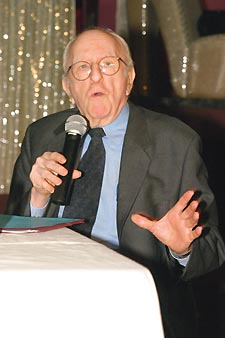 GLAA’s Frank Kameny at the community forum. |
“We were given a lemon and we made lemonade,” said Frank Kameny on Monday night, April 11, as a panel member at a community forum held at Ziegfeld’s to discuss the impending stadium. The longtime activist and member of the Gay and Lesbian Activist Alliance (GLAA) told the crowd that the O Street businesses are “part and parcel of the gay life in this whole metropolitan area.”
The forum was organized by organized by the D.C. Coalition, GLAA and the Gertrude Stein Democratic Club.
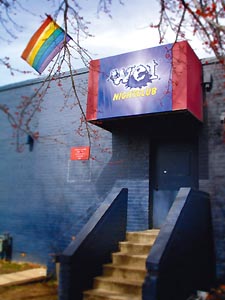 |
In a conversation before the forum, Siegel said that he’s going to do what it takes to keep O Street as it is.
“The entire block is a world famous business,” he says. “It brings mucho amounts of money to the district. The district doesn’t understand this. They just want to bring a baseball stadium here.
“I’m going to fight this. I have to fight this.”
Part of that fight includes a lawsuit filed Monday in D.C. Superior Court charging that the district’s chief financial officer, Natwar M. Gandhi, acted in bad faith in determining the cost to the city in acquiring the Southeast property and improving infrastructure and transportation for construction of the stadium.
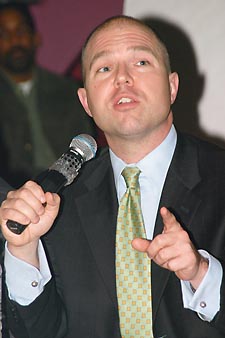 D.C. councilmember David Catania at the community forum. |
Councilmember David Catania, (I-At Large) who has worked with Siegel and his attorney on the lawsuit, said that Gandhi’s own report shows that the Southeast property can’t be acquired for less than $165 million. Under legislation passed by the council, said Catania, if the acquisition and infrastructure costs exceed that figure the city must seek out an alternate location for the proposed stadium. (Catania has posted the full report on his web site, www.davidcatania.com.)
Among the problems Catania cites with Gandhi’s report is that it calculated the value of properties in many instances based on sales figures from as long ago as fall of 2001.
“Who wouldn’t like to buy property in D.C. at 2001 [prices]?” Catania said.
The council member doesn’t believe the stadium is inevitable.
“If we live in a system with integrity under a rule of law, I think it will be stopped,” he said, “because to build it will be in violation of the council law.
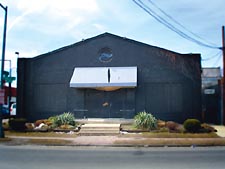 |
“If we had an honest CFO, this issue would be over right now.”
Catania was also one of the council members who participated in the Monday night forum, where he said that it was “unconscionable” to build the stadium at that location when “a perfect site exists at [RFK Stadium].”
The forum was an outlet for opponents of the stadium plan who feel that Mayor Anthony Williams and the city government have not been responsive to their concerns or appreciative of what the loss of these businesses would mean for the gay community. It was also a chance for City Council members to hear from business owners and others who would be impacted by the dislocation of the businesses.
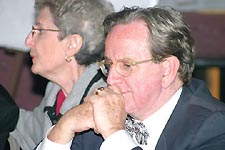 D.C. councilmember Jim Graham at the community forum. |
The city council members on hand were Jim Graham (D-Ward 1), Sharon Ambrose (D-Ward 6), Vincent Gray (D-Ward 7), Kwame Brown (D-At Large), Adrian Fenty (D-Ward 4), and Marion Barry (D-Ward 8). Ambrose was the lone baseball and stadium supporter on the panel, which drew a bit of praise from Barry for her willingness to publicly address the issue.
“It’s not about baseball versus these businesses,” Ambrose said, pointing to the development that has been going on for the past few years in the area, including the Navy Yard and the federal center construction. Those development pressures would eventually force these businesses to leave, and that was one of the reasons she said she worked with GLAA and others on the recent rewriting of the city’s Alcholic Beverage Control (ABC) legislation to have some options for those displaced by development.
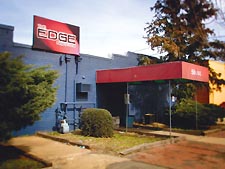 |
However, as Graham pointed out, even with those changes to the ABD law, options for relocation are very limited. Under current law, those businesses with a license permitting nude dancing can only relocate within their current zoning district or in the central business district, which includes downtown and some of the surrounding areas (though notably not Logan Circle). There are additional restrictions that come into play, such as not being located within 600 feet of a school, church or residence.
The barriers to those locations include the high cost of rent and smaller spaces in the business district. And the lack of available space within the current zoning district will only be exacerbated by future stadium-related development.
“What’s at stake really matters to the gay community,” Graham said, pledging to work to find a way to make sure that “every one of these businesses will continue to provide the type of entertainment that we as a community have grown to love.”
Special legislation or a regulatory exemption would likely be needed to allow any of the establishments to move to a new area. Ambrose said she would be willing to work with any of her colleagues who introduced such a measure, and Graham and Fenty both voiced support for such steps.
When the topic of legislative exemptions came up in the forum, Kameny lashed out at the assembled council members to simply pass the needed legislation to make relocation possible: “You make the laws! Goddammit, write the laws!”
Graham said that things aren’t so simple that the council can simply declare a new location for all the businesses.
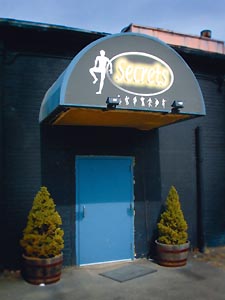 |
“Kameny’s points play well, but they don’t fly,” Graham said the next day. “No one in the District of Columbia will support a total relaxation of the law. It’s just not going to occur.”
Siegel and others have proposed that the city help move all of the O Street businesses together to a new location.
“The idea that if they’re willing to relocate as a group is a reasonable one,” said GLAA’s Rick Rosendall. “This problem was not the doing of these businesses. I think to demand a collective solution is the best way to go.”
However, Ambrose said that she did not believe that the businesses would all be able to move together, although again there could be a legislative solution.
Finding a new location for displaced businesses wasn’t the only topic on the minds of forum speakers on Monday night, who passionately spoke of other repercussions that would follow the construction of a stadium.
“These establishments have employed people in our community who are the marginally employable,” said Phil Pannell of the D.C. Coalition. “Major League Baseball won’t be lining up to…hire transgender people.”
Pannell said the loss to the community would go beyond the lack of social interaction and entertainment.
“These businesses have been on the forefront of our community,” he said, pointing to the 1980s and 1990s AIDS fundraisers led by such performers as Ella Fitzgerald.
“Don’t tell me now that it’s going to be steroid-hyped homophobes that are going to be the ones to come to the aid of our community,” he exclaimed to loud applause.
Although many expressed the hope and desire for the new stadium to be built at the existing RFK Stadium site, others feel that pragmatism demands planning for the stadium to proceed as currently envisioned.
“I think the likelihood of a stadium being built on this location is very, very high,” says Graham. “I don’t like it. I voted ‘no’ [on it]. But we can’t stick our heads in the sand on this issue. We have to start working on the details or…all of this will be gone.”
“I’m fairly pessimistic that the stadium deal can be stopped,” says Rosendall. “I would be interested in seeing them force a relocation to RFK, but the backers of the current deal seem determined to get their way.”
That pessimism extends even to some of the businesses in question.
“I think it’s so far down the radar scope of importance to the mayor,” says Rick Rindskopf, vice president and general manager of the Follies. “Let’s face it — we’re living in a time that’s become politically more conservative. I can’t help but think that there’s an element that’s looking at this as a way of — I hate to use this expression — ‘cleaning up the city.’
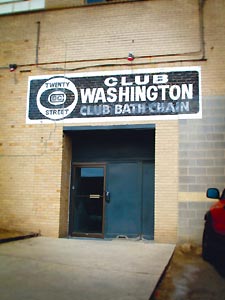 |
“I haven’t given up hope, but I’m not overly optimistic.”
Because the Follies, like Glorious Health and the Club Baths, is not an alcohol licensee, it faces a different set of challenges in trying to move to a different venue, Rindskopf said. As an adult-oriented business that shows sexually oriented videos and sells sexually oriented merchandise, the Follies has a non-conforming occupancy permit that, unlike other issued occupancy permits in the district, does not contain the words “for non-sexual use only.”
“[Ours] was issued in the late 1970s,” says Rindskopf. “According to my sources, it may well have been the last one [of that type] that was ever issued by the board of zoning.”
Because an occupancy permit is issued for a specific location, there is no guarantee that if a business moves the same type of permit will be issued for the new location. Rindskopf pointed to the disappearance of the adult-oriented businesses in the redevelopment of the downtown 14th Street corridor in the 1980s.
“I can’t believe [they didn’t reopen elsewhere] because they weren’t making money or didn’t want to,” Rindskopf said. If the Follies does not receive an appropriate occupancy permit if forced to move from the O Street location, “I suspect that we will go out of business.”
Rindskopf said the Follies would be interested in moving to a new area with their current neighbors, although it’s not a necessity.
“The advantage of moving together is that there’s a synergy. People come down and they go from one business to another. It provides an area for people to go for a specific type of entertainment.”
With more than 50,000 paid admissions per year, the Follies is known to the gay community across the country, he says, and has been for years.
“[But] I don’t think we’re trying to apply for a historic landmark designation,” he laughs.
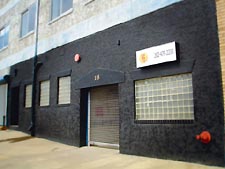 |
Still, Rindskopf sounds a bit melancholy when he looks back on the unique nature of the area and the role it has played in the ongoing growth of the gay community in D.C., and how difficult it will be to duplicate that.
“I can sympathize with the arguments of people who are against sexually oriented businesses, but we have freedom of speech and expression. The advantage of the current location is that it’s easily accessible but it’s not in anybody’s face. That’s a good way to run these kinds of businesses.
“It will be difficult to find a location that fills those requirements.”
Back in his office at Glorious Health, as he’s getting ready to head over to the forum next door, Bob Siegel complains that the whole affair is weighing heavily on him.
“I do like this mayor, but this stadium thing is upsetting me. It’s not only taking away my house — I live here — it’s taking away my commissionership, because I’m an ANC commissioner. It’s taking away all my income because I am a landlord of this area. This mayor has hurt me, because of his illegal contract with baseball.
“This really is a special area, and I don’t want to see it go.”
For links to more information about the proposed baseball stadium and community support and opposition for the project visit www.metroweekly.com.
Support Metro Weekly’s Journalism
These are challenging times for news organizations. And yet it’s crucial we stay active and provide vital resources and information to both our local readers and the world. So won’t you please take a moment and consider supporting Metro Weekly with a membership? For as little as $5 a month, you can help ensure Metro Weekly magazine and MetroWeekly.com remain free, viable resources as we provide the best, most diverse, culturally-resonant LGBTQ coverage in both the D.C. region and around the world. Memberships come with exclusive perks and discounts, your own personal digital delivery of each week’s magazine (and an archive), access to our Member's Lounge when it launches this fall, and exclusive members-only items like Metro Weekly Membership Mugs and Tote Bags! Check out all our membership levels here and please join us today!








